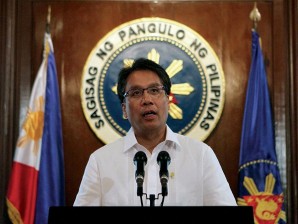To many, Mar Roxas’ presidential ambition is a given. I think, however, that a certain ambivalence attends his desire to occupy the one office that exceeded his father’s grasp. My Exhibit A is Roxas’ failure to run for a Senate seat last year.
I understand that if he had done so, he would have forfeited his election protest against Vice President Jejomar Binay. Was this the actual consideration? It is hard to believe that he would have traded a probable campaign advantage in 2016 for the unlikely prospect of a belated election-tribunal victory.
The last time Roxas won a national election unequivocally, he turned heads. He topped the Senate race in 2004, becoming the first candidate in our history to garner more than 19 million votes. Mr. Palengke (a political persona based on his service as trade secretary in both the Estrada and the Arroyo administrations) was suddenly presidential timber. But that was 10 years ago—an entire geological age in political time.
In the run-up to the 2010 presidential election, before he recognized and heeded the genuine draft powering Mr. Aquino’s presidential candidacy, Roxas saw his ratings plateau. His loss to Binay, which he continues to contest, will forever be part (albeit the wrong part) of a classic election story: Binay’s disciplined campaign and impressive long-shot victory.
Running for the Senate in 2013 would have given Roxas the luster of a winner, again. He would have begun to distance himself from the day-to-day problems of the Aquino administration, while continuing to embrace the reform initiatives he supports. And he would have given his considerable national campaign infrastructure the oiling it needed to prepare for 2016. In short, running (and winning) last year would have better positioned Roxas for a presidential campaign in two years’ time.
Why didn’t he run? A slot in the President’s Senate slate was his for the taking. Perhaps, to give him the benefit of the doubt, he saw it was his responsibility as a member of the President’s inner circle to stay in the trenches, to fight the President’s fights. But then that proves my point: If he had an overwhelming ambition for the presidency, he would have done (to use John Rawls’ categories) the rational thing,
rather than the reasonable one. He would have started redefining his public image as his own man, with his own contributions to make, by returning to the Senate.
Roxas’ statements since President Aquino’s fifth State of the Nation Address last month tell us how far he has to go, to reclaim his image (and his winning ways). Worse, his new justification for the startling idea of allowing President Aquino a controversial second term represents an inversion of the democratic values he must have learned from his father. The essence of the democratic project lies in the idea of limits: one person, (only) one vote; three branches (or two), not (only) one; a finite number of terms, not an endless opportunity to put policies, no matter how well-intentioned, into action.
The other day, Roxas rationalized the need for a possible second Aquino term in grand terms: “Nakikita ni P-Noy yung mga threats sa kalusugan ng demokrasya, sa kagandahan sa pagpapatakbo sa ating bansa (President Aquino sees the threats to the health of democracy, to the well-functioning administration of the country).”
In fact, the Marcosian move to change the Constitution to allow an incumbent president to run again is the bigger threat to the “health of democracy.” Surely Roxas knows this. The Inquirer editorial of Aug. 8 suggested that the interior secretary had deliberately manufactured a controversy. “[The second term proposal] was designed to focus public attention on a perceived continuity gap: Who is the right leader to take over the reins from Mr. Aquino? We can expect Roxas to hammer this point repeatedly, about the need to ensure ‘continuance,’ about the need to proceed on the straight path, because by defining the problem and being identified with it, he can propose himself as its solution.”
I find Roxas’ more recent statement about democracy and good governance particularly worrying because of its assumption that a well-functioning administration is all but equivalent to a healthy democracy. This is an upside-down view.
I am reminded of another Inquirer editorial, from last year’s Feb. 25 issue, which took the Edsa People Power Commission to task for putting the achievements of the Aquino administration ahead of the meaning of Edsa.
“So ‘Edsa 27’ is not an opportunity to express support for the ‘unprecedented … gains’ of the second Aquino administration. It is, rather, a celebration of that moment in history which serves as a source of standards by which to measure all administrations—including this one.
“In other words, the commission got it backwards. This year’s celebration of Edsa is not an occasion to highlight Mr. Aquino’s achievements; rather, it is an opportunity to hold these achievements to the light of history. Do they hold up, or will they crumble to dust after attention flags? Are they in keeping with the legacy of Edsa, or a betrayal of it?”
Roxas is presenting the trial balloon that is President Aquino’s proposed second term as good for democracy; he got it backwards. Democracy is the measure by which we find the proposal utterly wrong.
* * *
On Twitter: @jnery_newsstand
RELATED STORIES


